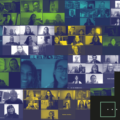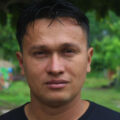
Workshop
Alba of the Caminantes
Alba, her name means sunrise, which makes us think of the first light that appears in the sky when the sun begins to rise. It is that first light that breaks through and overcomes the darkness of the night. Perhaps this is why Alba’s words are so scented with light and hope.
I first heard Alba’s recount on a webinar organized by the the #daretocare campaign in Latin America, of which she too has been an adherent. Promoted worldwide by young people from the Focolare Movement, in the context of the United World Project, #daretocare invites us to place “care” at the center of political discourse and civic life during this time of pandemic, taking care of the most vulnerable, taking care of the planet and of the problems of society. “Because a world that knows how to care, will be a more united world,” they explain.
Some time later, impressed by her story, I got hold of her via zoom.
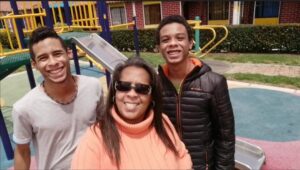
Alba Rada, a 45 year-old migrant, along with her two sons set off from her home in the city of Valencia on the Atlantic side of Venezuela, to reach another city one thousand kilometers away in the Colombian Department of Cundinamarca, called Tocancipá. Alba explains: “What made me realize that I had to leave was the theft of my auto by some 15 and 16 year-olds in the middle of the day, near my house, at gunpoint – as my son stood close by.” The social crisis had exploded in Venezuela, inflation and shortages of electricity, milk, rice, meat, basic necessities, medicine and adequate medical care. In her homeland, Alba ran a graphic design company. She was well off financially, but no longer feeling safe because of the social problems, the revolts and the raids. “I was afraid that something would happen to my children. There have been many kidnappings in Venezuela, called “express” kidnappings in which you have to pay the ransom within 24 hours. The pressure was strong. . .” When she thought about nearby Colombia, the first thing that came to her mind was the guerilla and the drug trafficking. But her sister spoke to her about that little town with 30,000 people where there was a vibrant community of the Focolare Movement which she had known from the time she was just four years old. The community was ready to welcome them and there would even be a school for her children, called Sol Naciente (Rising Sun) that almost sounded like her own name. As soon as she obtained all the necessary documents, they left. “When I arrived in Tocancipá, the members of the Movement welcomed us warmly. They offered me advice and found me a place to stay while I looked for a house. They organized a supper during which they gave me kitchen utensils and housewares; in other words, they took care of me,” Alba recalls.
The time had come for someone like her who had spent her life being on the giving end, to be on the receiving end: “When I was 13 years old, the Focolare foundress, Chiara Lubich, assigned me a sentence from the Gospel that I could spend my life putting into practice: ‘There is more happiness in giving than in receiving.’ It was my slogan.”
To show me how concretely she lived that sentence, she went on to explain: “In 2006, I started the “Birthday Party for Baby Jesus,” event, a perfectly normal birthday party with all the normal trimmings, including a pinata, a Cotillon and presents. It was a way of celebrating Christmas with the children who, because of their poverty, couldn’t celebrate it.” Alba didn’t act alone. At first, she involved her family and friends, then, her clients, suppliers and colleagues at work who embraced the project that has continued for three years and engaged more than 200 children. “Their happiness and gratitude was the proof to all of us that the Gospel sentence was true: “There is more happiness in giving than in receiving.”
But now she finds herself on the receiving end, uprooted and living in Tocancipá. It was time to think about herself, finding a house and a job which she did find at Sol Naciente School in administration. Meanwhile, the streets of the small town, 20 kilometers from Bogota, were filled with more and more caminantes, Venezuelan migrants in search of hope.
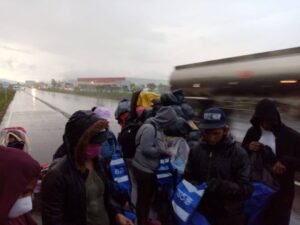
“With the passing of the years, Venezuelan migration has intensified and many of my compatriots have decided to move to Tocancipá or the surrounding regions. Being the first Venezuelan to arrive here, people are always being referred to me, people who are in need of guidance or help with their documents. It was once again time for me to ‘dare to care’!” So, she began to learn about the bureaucracy and became the point of reference for the collection of basic necessities and other goods. Along with her collaborators, she created a WhatsApp where news and needs could be shared. “Caminantes are always passing through our town on their way to Bogota. They arrive after days of travel, without a place to stay or protection from the bad weather, often with a high level of malnutrition. There are entire families with youth, children and adults in search of work to support themselves and to send money to their relatives back in Venezuela. There are families with parents who aren’t able to find a stable job, and children who are depressed to the point of suicide.” This gave Alba another idea: “In 2018, I managed to set up a non-for-profit association called “RadaBer,” which is like the company I had back in my own country. Its statutes state that it is for the promotion of universal fraternity and human development. We receive all kinds of donations, because the needs are so great – from health to food, housing to housewares, and schooling.” Now, with the pandemic, the association focuses on helping Venezuelan migrants, to face the economic impact, because thousands of people have lost their jobs in Colombia due to the national blockade imposed by the government to slow the virus.
“We take care of 600 families in the communes of Gachancipá, Tocancipá, Sopó and Zipaquirá, and we connect with the organizations in Arauca, since they are able to reach 300 families who are living on the streets. There are also Venezuelan migrants who have decided to return to their country, often on foot. We provide them with sleeping bags, snacks, sunscreen and toilet paper.” Alba continues to dream big and hopes, one day, to involve professionals in her network, companies that will help to take in the migrants and… “we’re always in need of donations just to be able to continue operating, because our supporters have also been hit hard by the pandemic. In the meantime, we carry on taking care of migrants and of ourselves. If we want to have a healthy society, we have to become personally engaged.”
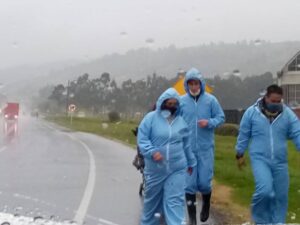
If you want to make a donation to the RadaBer Foundation, go to: https://vaki.co/es/vaki/donaafundacionradaber
Source:
